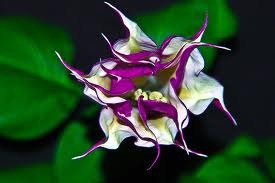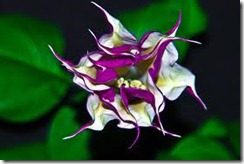A member of the Solanaceae family, the angel trumpet plant (Brugmansia) is a close relative of the petunia, tomato and potato. Native to South America, angel trumpet thrives in the landscape as a hardy, herbaceous shrub. Highly ornamental, the angel trumpet plant puts on its best show at night. The large blooms of the angel trumpet open up once darkness falls, and remain open until the sun comes up in the morning.
Identification
-
The angel trumpet plant measures between 4 and 5 feet tall, with a 5-foot spread at maturity.The plant produces dramatic, trumpet-shaped flowers that bloom in shades of white, pink, orange, red and yellow, just to name a few. Angel trumpet flowers measure 6 to 8 inches in length, and give off a pleasing aroma that is highly noticeable in the evening.
Geography
-
Angel trumpet plants are hardy in USDA planting zones 9 through 11, where the winter temperatures do not fall below 20 degrees Fahrenheit. In its natural environment, the angel trumpet plant grows within the moist soils of country meadows and sloped terrains. In the garden environment, angel trumpets prefer sunny, well-drained soil, kept moist at all times to a 1-inch depth.
Soil Preferences
-
Gardeners should consider a soil test prior to planting an angel trumpet plant. Angel trumpets prefer to grow in soil with a pH between 6.5 and 7.0. A soil test purchased from a garden center can help to determine the pH of the soil. If the test comes back with a pH lower than 6.5, lime added to the soil will raise it. For a soil test that measures above 7.0, peat moss mixed in with the soil will lower the pH. Both the lime and the peat moss are applied according to manufacturer’s instructions.
Pests
-
The angel trumpet plant is prone to pests, such as spider mites and caterpillars. Caterpillars are the most damaging of the two, ravenously eating the leaves of the angel trumpet when left to feed on the plants. A steady stream of water is usually enough to deter spider mites but the caterpillars may require handpicking or the use of an insecticidal soap applied per label instructions.
Warning
-
It is important to keep in mind that the foliage and flowers of the angel trumpet plant are poisonous. In fact, Better Homes and Gardens reports that some localities have banned the planting of angel trumpets. Symptoms of angel trumpet poisoning include hallucinations, muscle weakness, dry mouth, fever, paralysis and a rise in blood pressure and pulse rate. Suspected ingestion requires immediate medical attention.


Deprecated: strpos(): Passing null to parameter #1 ($haystack) of type string is deprecated in /home/agriviek8Qv/agriviet.net/public_html/wp-includes/comment-template.php on line 2522